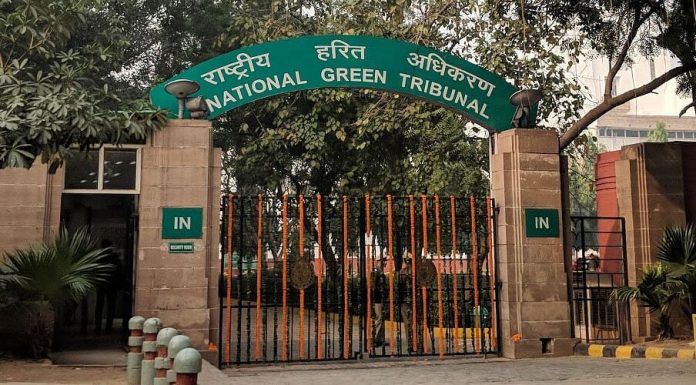This article is written by Raslin Saluja from KIIT School of Law, Bhubaneswar. This article breaks down the decision of the National Green Tribunal regarding the enforcement of the regulatory mechanism in the operation of the poultry farms.
Table of Contents
Introduction
The Central Pollution Control Board (CPCB) had categorized poultry farms with birds less than one lakh in number under the green category industry thereby exempting them from the scope of various laws like the Water (Prevention and Control of Pollution) Act, 1974, Air (Prevention and Control of Pollution) Act, 1981 and the Environmental Protection Act, 1986. To that end, the National Green Tribunal asked them to revisit their guidelines as the poultry farms contribute to pollution and therefore cannot be exempted.
Facts of the case
The present case is an appeal by the animal activist Gauri Maulekhi, who had admitted a grievance on 07.11.2017 against the CPCB guidelines given in 2015 pertaining to poultry farms. The applicant had objected to a very specific part of the guidelines which stated that the poultry farm filled with the capacity of 1,00,000 or more birds at a given time in a single location will have to approach the State Pollution Board Control to get their permission and consent for operating under the Water (Prevention and Control of Pollution) Act, 1974. Further hatcheries of any size, feed mills of any capacity, and a commercial poultry farm managing the capacity of 5000 plus birds at a given time on a single location will have to register themselves with local bodies. In addition to that, a grievance was against a direction issued by the CPCB on 29.02.2016 to treat commercial poultry farming under the category of the green industry.
Contentions by the appellant
Herein, the contention was that classifying poultry farms as green is arbitrary. A poultry farm that has less than one lakh birds should not have been left out of the regulatory mechanism of the State PCBs/PCCs as it goes against the concept of sustainability principle and thereby defeats the object/purpose of that very mechanism.
Since the chickens are destined for being commercially used in the egg industry, they are artificially incubated/treated and hatched at the commercial hatcheries. Accordingly, these hens are transferred into small barren wire cages known as battery cages placed adjacent to each other when they are at the age of around 16 weeks. Further, the battery cages are too small for the hens to even spread their wings, thousands of such cages are lined up in the length of about 3-5 tiers in multiple rows. The hens remain all cooped up with the floor area being smaller than the size of an A4 paper sheet. Nothing about the process is organic and all the natural behaviour of the hens like perching, roosting, scratching, exploring, and foraging is suppressed by the battery cages.
Unhygienic living conditions and risk to public health
That the areas surrounding these farms are filled with huge disposal of waste produced due to the intensive confinement of the birds causing a substantial amount of pollution. It is rare that the waste is ever scientifically disposed of as given under the laws which in turn routinely attracts flies, ticks, lice, maggots, mites, scavenging birds like pests, and even stray dogs to the poultry farms. All these create unhygienic living conditions and an intense odour spreads through the farms creating nuisance in the entire neighbourhood. Added to this is the accumulated faecal matter in the cages which is an environmental as well as health hazard creating a hub of pathogens affecting humans as well as the birds. Furthermore, to boost the survival of the birds in such living conditions, they are treated with non-therapeutic antibiotics that too as a precautionary measure despite no emergency medical needs, which later on gets transferred into the human bodies when they consume their eggs or meat, building an antibiotic resistance.
This creates a direct impact on the ecology and lives dwelling around the area which has further been supported by several newspapers and articles. One such article is published on 07.05.2017 in “The Tribune” under the title “children cannot eat, study courtesy the houseflies” coming from the adjacent poultry farm who have made life miserable. Similar stories were highlighted in various other reports like “The Hindu”, “The Indian Express”, “Poultry, Fisheries and Wildlife sciences, “Indian Journal of Community Medicine stating that the breeding of the flies in the poultry farm’s dumped waste. The state of manure management is very poor, polluting the soil, and water around the area while spreading an offensive odour and pests capable of affecting the human lives around the areas.
Misuse of antibiotics
There is a violation of the Drugs and Cosmetic Act, 1940 by extensively using antibiotics on a routine basis has also become a threat for human lives living around the year as well those who consume the poultry products. Developing antibiotic resistance has been an alarming concern as per several studies such as National Action Plan on Antimicrobial Resistance (NAP-AMR) 2017-2021, a study of Antibiotic Resistance in Poultry Environment, Spread of Resistance from Poultry Farm to Agricultural Field, a study dated 20.07.2017 done by Bloomberg article titled “Indian Poultry Farms Are Breeding Drug-Resistant Superbugs” focusing on how the poultry farms have become breeding grounds for drug-resistant superbugs, a study dated 20.07.2017 titled ‘The Prevalence of Extended – Spectrum Beta-Lactamase-Producing Multidrug-Resistant Escherichia Coli in Poultry Chickens and variation according to farming practices in Punjab, India, a report on “Environmental Status of Some Poultry Farms in India” by CSIR-National Environmental Engineering Research Institute (NEERI), Delhi Zonal Centre, Ministry of Science and Technology and 269th Law Commission Report on Transportation and House-keeping of egg-laying hens (layers) and broiler chickens dated July 2017. Further, reference has been made to the report by CSIR- National Environment Engineering Research Institute (‘NEERI’) titled ‘Environmental Status of Some Poultry Farms in India’, recommending cage-free farming for a hygienic environment.
That the farms are a breeding ground for flies, rodents, and disease-carrying pests along with the spreading of odour and volatile emissions of ammonia, hydrogen sulfide, a large number of chemicals, pesticides, and antibiotics all deteriorate the public health and environment. These cause diseases like avian influenza. The misuse of antibiotics is on a rise spreading multidrug-resistant bacteria through unsafe poultry litter disposal and waste into agricultural land. Further, the use of non-therapeutic antibiotics is being used against the recommendation by NEER-CISR, where the hygienic living conditions for the birds are maintained then there will be no need for administering the antibiotics to them.
Sustainable development
Thus, the order exempting poultry farms from registration under with the Pollution Control Boards under Section 21 of the Air (Prevention and Control of Pollution) Act, 1981 and Section 25 of the Water (Prevention and Control of Pollution) Act, 1974 given by CPCB, was questioned as being unfavourable and damaging towards the principle of sustainable development and having a clean environment under the right to life, where it is against Section 20 read with Section 15 of the National Green Tribunal Act, 2010 which requires the NGT to enforce that above-mentioned principle. Referring to the aforementioned conditions calls for effective regulation and non-exemption of the regulatory mechanism to keep the situation in check.
Contentions by the respondents
The Tribunal acted by way of issuing a notice to the Ministry of Environment, Forest and Climate Change (MoEF & CC), CPCB, and Central Drug Standard Control Organization (CDSCO). The association of poultry farms was also allowed to be a party and intervene after previously being denied. Though the CPCB in its reply stated that usage of antibiotics was a concerning issue under the purview of Animal Husbandry and the Drug Control and Food Safety Departments, however, they did not justify why such exemption from the earlier mentioned Acts was granted to the poultry farms with birds less than one lac. Similarly, the reply sought from the MoEF & CC, Ministry of Health and Family Welfare (MoHFW), Food Safety and Standards Authority of India (‘FSSAI’) did not provide any justification for such exemption. The Ministry of Welfare just stated the antibiotic use was under the governance of the Drugs and Cosmetics Act and the Antibiotic Policy of the Ministry. FSSAI said that the standards have been laid for the food types, but none of them addressed the central issue.
While on the other hand, the poultry association emphasized the significance of poultry and its eggs and the requirement of antibiotics. In their reply they stated that since the poultry farms were situated far away from the residential areas therefore they did not have any effect on the residents, rather such commercial activities help uplift the rural areas and provide them economic support as a source of livelihood. Besides, eggs and chicken provide a cheap source of protein.
Tribunal’s observation
Along with the other submissions, the Tribunal also received a copy of the Ministry of Agriculture and Farmers Welfare’s notification dated 29.04.2019 which outlines the responsibilities of the poultry farm owners. It requires their compliance with the rules as per given environmental conditions for the welfare of layer hens which require registration with the Department of Animal Husbandry, Dairying, and Farming. The Ministry of Animal Husbandry has also filed an affidavit to the effect that PILs are pending before the Delhi High Court on the subject of compliance with the provisions of the Prevention of Cruelty Animals Act, 1960 and rules framed relevant to the subject.
After considering at length, all the pleadings and the submissions, the tribunal summarized that that exempting the said category of poultry farms from the regulated mechanism or application of nay safeguards is detrimental to the environment since it produces huge waste which attracts pests and has the potential for disease along with spreading a foul odour in the nearby areas. Thus, the Tribunal stated that this exemption would amount to a failure to protect the environment and mere asking the farms with more than 5000 birds to register themselves under the local bodies cannot replace the actual statutory requirement, that too when the CPCB lacks any authority by law to delegate its powers to the local bodies. Referring to the report of NEERI, the Tribunal further added that this categorization of the said farm as green by the MoEF and CC is also arbitrary and not based on any logic.
To that end, the Tribunal directed the CPCB to reconsider its policy and seek the applicability of the consent regulatory mechanism under the Water Act, 1974 and the Air Act, 1981. This direction was based on the 2019 order of Nuggehalli Jayasimha v. Government of NCT of Delhi which dealt with the compliance requirements of environmental norms by dairies. In that case, the Tribunal had directed the Delhi Pollution Control Committee (DPCC) to fulfil its responsibility under the Water Act, 1974 and the Air Act, 1981 by making the dairies comply with the norms and guidelines pertaining to the environment. The Tribunal rejected their plea for having a provision in the municipal laws to address the issue and stated that having a substitute or an overlapping provision does not release the environmental authorities from their responsibilities.
The Tribunal acknowledged the state’s obligation and responsibilities towards the environment as per the principle of sustainable development and the public trust doctrine. That all these acts have been enacted as a result to create and enforce these obligations on the regulatory authorities to take appropriate measures for the protection of the environment in pursuance of various international conventions that the country is a member of. The authorities do not have the discretion to exempt the compliance of regulatory mechanisms which are mandated by the statutory law. Thus, likewise considering the potential pollution that might be caused in carrying out the operations of the poultry farms except for small ones, say up to 5000 birds cannot fall in the ‘Green’ category as has been done by the CPCB.
Conclusion
In pursuance to that, the Tribunal directed the CPCB to revisit the guidelines under the respective applicable Acts and issue fresh appropriate orders within three months, which if they do not then all the State PCBs/PCCs will require to comply with the consent mechanism under the above Acts after 01.01.2021 for all poultry farms above 5000 birds in the same manner as is being done for farms having more than one lac birds. Further, till the time fresh directions are given, even without the enforcement of the consent mechanism, the State PCB/PCCS may strictly adhere to the norms and take remedial action against any breach of the statutory law.
References
- https://www.newindianexpress.com/nation/2020/sep/19/poultry-farms-cause-pollution-cant-be-exempted-from-regulation-ngt-2199096.html
- https://www.livelaw.in/environment/operation-of-poultry-farms-has-potential-to-damage-to-the-environment-which-needs-to-be-regulated-ngt-issues-directions-read-order-163216
LawSikho has created a telegram group for exchanging legal knowledge, referrals and various opportunities. You can click on this link and join:
 Serato DJ Crack 2025Serato DJ PRO Crack
Serato DJ Crack 2025Serato DJ PRO Crack











 Allow notifications
Allow notifications


